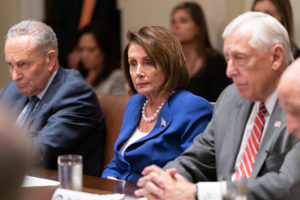
Spending more money to end inflation is much like drilling a hole in the bottom of a boat to let the water out. Yet, that’s just what many Democrats want to do. In The Wall Street Journal, former chairman of the Senate Banking Committee Phil Gramm, and former Deputy Staff Director of the Senate Banking Committee Mike Solon, point out the inanity of Democrats’ attempts to justify more spending as a way to stop inflation. They write:
For 40 years, the pain of inflation was only a fading nightmare. Then last year, piled on top of Donald Trump’s ill-advised postelection spending surge, the Biden administration, the Democratic majority in Congress, the Federal Reserve, and a chorus of intellectual supporters assured the nation that with accommodating monetary easing by the Fed, they could increase federal spending by 54% without causing inflation. When—shockingly—prices started to rise, those same voices harmonized in assuring the nation that any inflation would be minor and temporary. To this day, they blame the inflation on supply-chain problems and the usual suspects: big business, insufficient antitrust enforcement and greedy profiteers. They never blame government.
Obviously the pandemic disrupted the economy and contributed to inflationary pressures, but U.S. production is higher today, and U.S. ports are moving 27% more goods than before the pandemic. Inflation, driven by excess demand, always faces supply-chain problems as production struggles to keep up. But supply-chain problems increasingly are the result of inflation rather than its cause.
What was billed as minor and temporary inflation has risen at rates unseen for four decades. So rapidly have prices risen that despite increases in nominal wages, real median weekly wages are $11.58 lower today than when President Biden took office. That decline in real wages is 19% larger than the decline that occurred during the entire subprime financial crisis.
But as American workers suffer declining real wages, Democrats and outside experts assure us that spending another $4.9 trillion to fully fund the Build Back Better plan is the key to ending inflation. This claim, which Minority Leader Mitch McConnell describes as Democrats’ “inflating their way out of inflation,” reminds us of the old George Orwell observation: “One has to belong to the intelligentsia to believe things like that: no ordinary man could be such a fool.”
As in the late 1970s, inflation is punishing workers, consumers and savers. But the government is largely protected. More than half of the federal budget is composed of entitlements, most of which are automatically adjusted for inflation (with a one-year lag). The remainder of the budget is set at a “current services baseline” that assumes all government programs will be increased by at least the inflation rate.
But if government and its beneficiaries are protected from inflation, who bears its brunt? The people who do the work, pay the taxes, and pull the wagon in America—especially blue-collar workers who have no automatic inflation adjustments in their employment contracts and who put their savings in certificates of deposit—will find no shelter in this storm. Those who were paid extra to come back to work and those who got big government checks will take a smaller hit, but the biggest losers will be the Americans who soldiered through the pandemic, stayed at their jobs, cared for the sick, kept food on our tables, and kept the country secure. No Democrat in Washington is standing up for their interests—except Mr. Manchin.
If history is any guide to the future, and of course it is the only guide, the voters will render judgment in 2022. At this point in the inflation cycle of the late 1970s, conservative Democrats were winning primaries and being elected to Congress and the Carter administration was changing policy. The real question is not why Mr. Manchin is standing up against inflationary spending but why the senator from West Virginia stands alone. Is compassion now something Democrats can feel only for people riding in the wagon? Is the Biden administration so dominated by leftist zealots that, unlike the Carter administration, it is more committed to its transformational agenda of expanding the dominance of government than it is to stopping the inflation?
Read more here.



